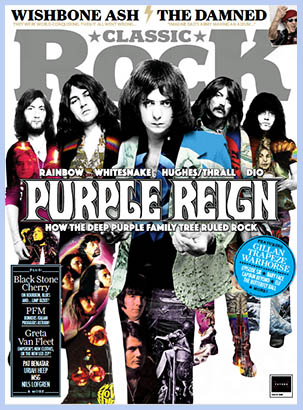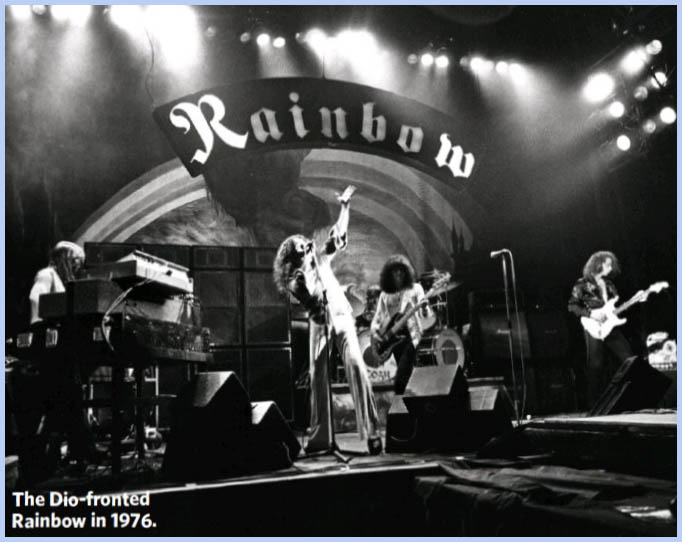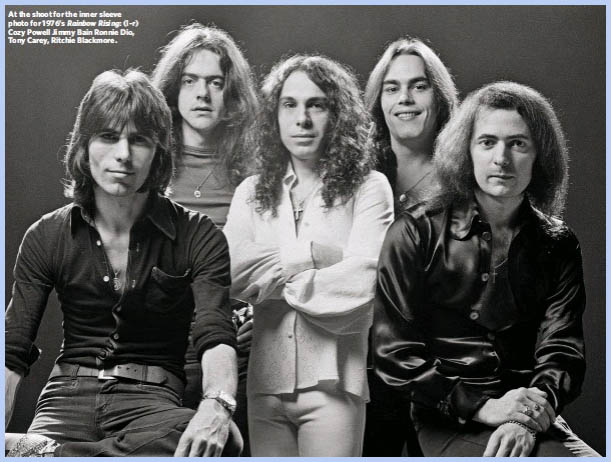|
Rainbow Dio & Rainbow Had Ritchie Blackmore not left Deep Purple, we would never have had one of its greatest offshoots, and might never have become aware of one of the greatest singers in rock.  Ritchie leaving Purple led to one of their greatest offshoots, and brought to our attention one of rock's greatest singers.
Ritchie leaving Purple led to one of their greatest offshoots, and brought to our attention one of rock's greatest singers.The godfathers of so much that excelled about British rock in the decade that followed their original 1976 demise – Gillan, Whitesnake, Rainbow, Black Sabbath – perhaps the greatest gift Deep Purple bequeathed the world was to help bring forth the exquisite talent and indomitable spirit of American singer Ronnie James Dio. Before Ritchie Blackmore worked with Ronnie Dio, the guitarist had envisaged what eventually became the first Rainbow album as little more than a side project; a one-off solo escapade inspired by Purple's rejection of a new Blackmore piece he titled 16th Century Greensleeves – the kind of stomping pomp-rock hauteur that Purple had once considered their music fortress, but now, in the wake of the white-soul groove Glenn Hughes and David Coverdale were more keen on exploring, was distinctly old hat. As Blackmore said in 1983: "I left because I'd met up with Ronnie Dio, and he was so easy to work with. He was originally just going to do one track of a solo LP, but we ended up doing the whole LP in three weeks, which I was very excited about." Or as Dio would later put it: "I was always a dreamer type of kid. I immersed myself into fantasy situations by reading science fiction and things that would let my imagination run somewhere. I think there's a tremendous kinship between science fiction and the mythological era, and I applied all of that to my lyrics." Well he did after joining up with Blackmore, anyway. Before that, Ronnie Dio occupied a lot of different musical spaces – and times. The only child of a poor immigrant Italian family, Ronald James Padavona was born in Upstate New York on July 10, 1942 – although for most of his career he insisted he'd been born in 1949. As the newly installed frontman of Rainbow, he may have been ballsy enough to stand in front of thousands and conduct musical lightning, but Dio the fledgling rock star didn't like Rainbow fans knowing he was already 33 by the time he'd been given the opportunity to do so.  Mainly it came down to respect, such a vital component in the self-esteem of Italian-American culture. Ronnie Dio was a man with impeccable manners, generous with his time, funny and kind. Unless you showed him disrespect. He never forgave Ritchie Blackmore for not giving him equal billing in Rainbow. Still furious years later, he told me how "when we first got together it was agreed the group would be called Ritchie Blackmore And Ronnie James Dio's Rainbow. But when the first album came out, there it was: 'Ritchie Blackmore's Rainbow'! What was that about?" Raised as a Roman Catholic, Ronnie James Padavona's real religion was music. He had already learned to play bass, piano and trumpet long before he knew he could sing, and joined his first band, the Vegas Kings when he was 15. Showing the same gritty determination to lead by example that would characterise his whole career, he'd soon swapped the bass for a microphone as the group metamorphosed into first Ronnie & The Ramblers and then Ronnie And The Red Caps; hit YouTube and you can still find young Ronnie fly-me-to-themoon-ing in tux and bow ti). There was no denying that incredible voice, though. Singing just came naturally. "Unlike learning to play an instrument, it just seemed to be something that was there immediately," he told me, "a gift". Playing the trumpet gave him an edge, he recalled. "Partly to do with knowing how to breathe, partly to do with the fact that the trumpet has its own voice, its own way of phrasing." By the late 60s he'd also changed his name, after a notorious mafia figure, Johnny Dio, "because it sounded cool", the band becoming Ronnie Dio And The Prophets. It wasn't until '67 and the summer of love that he grew his hair, stopped shaving, started smoking dope and formed his first rock band, the Electric Elves – later shrunk to Elf. On stage Dio would stand there banging a cowbell, the band pulling out all the stops with covers of Black Dog, War Pigs, Aqualung... or when the mood took them and the audience demanded hits, he'd give them Lennon's Imagine, The Beatles' Can't Buy Me Love... anything to keep the party going and the paid gigs coming in. Until the band began writing their own stuff. "It was the first band we had which tried to make it with its own original material," Dio told me. It was also the first time the singer really got noticed, when Elf was signed to a new record label formed by English rock goliaths Deep Purple. Ian Paice and Roger Glover produced Elf's first, eponymously titled album, and in 1974 they were invited to support Purple on a US tour. So far, so good. What's less known is how much closer – in loose-hipped style – Elf were to original good-time Gillan-era Purple than to the kind of medieval metal of Dio-era Rainbow. "The kind of songs I wrote in Rainbow all had a more Renaissance-style aspect to them," Ronnie would tell me. "Ritchie and I had always seen Rainbow as being musically a meeting between heavy rock and heavy classical sorts of themes. What I wrote wasn't poetry, but it was written to say something more than 'Baby I love you'." Listening to tracks like Self Portrait from their 1975 debut Ritchie Blackmore's Rainbow, you could hardly argue with that. Described by Blackmore as like "a cross between Bach's Jesu, Joy Of Man's Desire and Hendrix's Manic Depression", Dio clearly means it when he sings lines like, 'Paint me a picture of eyes that never see/With flashes of lightning that burn for only me'. Contrast that, though, with Black Swampy Water, the opening track of the third and final Elf album, Trying To Burn The Sun, released the same year: 'Uh, back in the wood/ Where it's good/Well I saw me a child/She was wild/Like a lady going all out.' This was set to a good-timey Stones/Faces barrelhouse groove. It's a great, fun track, actually, well sung, well played, but about as far from Bach as Turner and his Overdrive.  Yet it was Elf – minus guitarist Steve Edwards – that Blackmore co-opted to play on that first album. Indeed you can hear the Elf steamroller going full pelt on classic Rainbow tracks like Man On The Silver Mountain, and you can hear how much wiser-time soul they injected into the dreamy Catch The Rainbow. But that was Ronnie Dio. Someone who'd learned to roll with the punches and always knew exactly what he was doing. Doug Thaler was the keyboard player in the Electric Elves from '67 until a car crash in '71 that left guitarist Nick Pantas dead and Thaler in hospital for months. He recalls a pre-fame Dio as "someone who was always very driven. He had been trying for success for a lot of years before he finally got his break with Rainbow. By the time Elf got their deal with the Purple label, Ronnie had already released half a dozen singles on half a dozen labels. He was very frustrated. I think he was worried he'd missed his chance." Thaler confirms that it was only after Dio began working with Blackmore that he developed his penchant for writing about there being 'no sun in the shadow of the wizard', as he did on Rainbow classics like Stargazer. "He only became a heavy metal guy after he'd spent time touring with Purple and started in with Rainbow. But Ronnie was a great guy. He was one of those people that if he met you in a club he'd remember your name for the rest of his life. He was a great guy to hang out with, a guy's guy." On stage, Dio took the same highly personal approach to building his relationship with the audience. As he told me: "When I stand on stage and sing, I like to imagine I'm looking into the eyes of every single person in the audience, that I'm singing specifically for them. And when I'm introducing a song, I never shout, I simply speak to them as though we were having a private conversation. Partly, it's because I've always hated frontmen that simply shout and leer at an audience, treating them as though they were one big blob. I've always thought that was so rude. And mainly it's because I take what I do very seriously. Don't get me wrong, I like to have fun up there. But I really do mean every word I sing or say. And I want people to know that." It was the second Rainbow album, though, Rainbow Rising, that catapulted the band into the annals of rock history. Released in 1976, just weeks after MkIII Purple's final show in April, and featuring what is now considered the quintessential Rainbow line-up – all Dio's former Elf sidemen replaced by rock veterans, drummer Cozy Powell, bassist Jimmy Bain and keyboard player Tony Carey – Rainbow Rising set the benchmark by which heavy metal albums would be judged throughout the rest of the 70s. Certainly it was one of the best albums Dio would ever sing on. "Yeah, I'd agree with that," he said nonchalantly. Unfortunately, with the line-up fracturing again (neither Bain nor Carey survived the cull) before the recording of a follow-up could begin, the band's potential was never fully explored. "It was a shame, but that's the way Ritchie liked to work, in order to keep things fresh," Dio told me, straight-faced. Then once the tape recorder was turned off, what "an asshole" Ritchie was. "People still tell me how surprised they were when I left the band shortly after. The truth is, I was kinda surprised myself," Dio joked years later. As he confessed: "Ultimately, it was Ritchie's choice, yes. But it was also mine, in that I knew I couldn't give him what he wanted. The answer lies in what the band did after I left, which was singles like Since You've Been Gone. It's a great song and it was a big hit for them, but it's not one I would have written or sung with them. It was mainstream pop-rock, and that's where Ritchie wanted to go. If I'd wanted to go there too, then I'm sure we could have continued working together. But I didn't." The irony: that a straightforward, chorus-heavy rock'n'roll belter like Since You've Been Gone would have fitted 'whoa-yeah-mama'-era Elf like a velvet glove wrapped around an iron fist. Yet another strand of the Deep Purple family circle left to tantalise the 'What if...' brigade. © Mick Wall, Classic Rock Magazine - May 2018 |